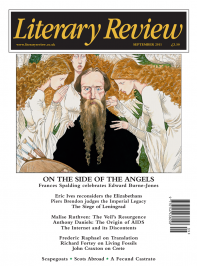Jonathan Barnes
Jonathan Barnes on Five First Novels
This year’s longlist for the Man Booker prize is an unusually intriguing one. Alongside commendations for such established writers as Alan Hollinghurst and Julian Barnes is a surprisingly healthy amount of what publishers might designate as ‘genre fiction’ (D J Taylor’s Derby Day; A D Miller’s Snowdrops) as well as an encouraging number of first novels.
Stephen Kelman’s Pigeon English (Bloomsbury 288pp £12.99) is one such debut. Its hero is Harrison Opoku, an eleven-year-old Ghanaian boy who lives on an inner-city housing estate with his mother and sister. At the beginning of the story Harrison, with the aid of a pair of plastic binoculars

Sign Up to our newsletter
Receive free articles, highlights from the archive, news, details of prizes, and much more.@Lit_Review
Follow Literary Review on Twitter
Twitter Feed
Russia’s recent efforts to destabilise the Baltic states have increased enthusiasm for the EU in these places. With Euroscepticism growing in countries like France and Germany, @owenmatth wonders whether Europe’s salvation will come from its periphery.
Owen Matthews - Sea of Troubles
Owen Matthews: Sea of Troubles - Baltic: The Future of Europe by Oliver Moody
literaryreview.co.uk
Many laptop workers will find Vincenzo Latronico’s PERFECTION sends shivers of uncomfortable recognition down their spine. I wrote about why for @Lit_Review
https://literaryreview.co.uk/hashtag-living
An insightful review by @DanielB89913888 of In Covid’s Wake (Macedo & Lee, @PrincetonUPress).
Paraphrasing: left-leaning authors critique the Covid response using right-wing arguments. A fascinating read.
via @Lit_Review